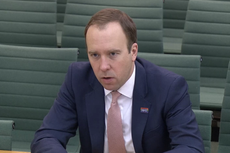Emergency children’s care rules that removed protections dating back decades declared unlawful
Judgement called ‘a huge victory for children’s rights’ after strong criticism of Gavin Williamson

Emergency care rules that snatched away safeguards dating back decades have been declared unlawful, in what has been called “a huge victory for children’s rights”.
In a damning verdict on Gavin Williamson, a panel of judges concluded he broke the law in excluding the Children’s Commissioner and other organisations from the rushed decision.
The ruling was welcomed by Anne Longfield, the Commissioner, who – The Independent revealed in the summer – had attacked the stripping back of visits and inspections for many months.
England’s most vulnerable youngsters had been left with less protection, including from sexual abuse by grooming gangs, she had warned.
Ms Longfield said today: “The Court of Appeal has unequivocally recognised the fundamental importance of ensuring that not only the Children’s Commissioner, but crucially also those who represent the rights of children in the care system, are consulted in relation to important decisions about them.”
Oliver Studdert, representing Article 39, a children’s charity, said: “This is a huge victory for children’s rights and is evidence that the law can be used to hold the government to account.”
Article 39 had challenged the rules, brought in at the start of the Covid-19 pandemic, arguing there were no fewer than 65 separate removals, or dilution, of protections.
One requirement lifted – for a six-monthly review of a child’s care – has been traced back to the manslaughter of a 12-year-old by his foster carers way back in 1944.
Another relaxation allows social workers to contact children living in care, or privately fostered, as soon as “reasonably practicable” – rather than within one week initially, and every six weeks for the year after that.
And children can be locked up in care homes if they are showing symptoms of coronavirus – without, it is feared, clear guidance for monitoring this.
Article 39 said the unanimous judgement backed its submission that the Department for Education had consulted “on an entirely one-sided basis and excluded those most directly affected by the changes”.
Had children’s rights organisations been included, the Education Secretary “would have unquestionably been better informed about the impact of the proposed amendments on the vulnerable children most affected by them,” Lord Justice Baker said.
“The Secretary of State acted unlawfully by failing to consult the Children’s Commissioner and other bodies representing the rights of children in care before introducing the [legal changes],” the judgement said.
An “overjoyed” Carolyne Willow, Article 39’s director, said: “This should draw to a close backroom, secret government consultations which exclude the rights, views and experiences of children and young people.
“The government’s actions were shameful, both in the scale of the protections they took away from very vulnerable children in England and the way they went about it.
“Many hundreds of care experienced people, social workers, children’s lawyers and others working in social care could see straightaway what was so dangerous about these changes.”
Join our commenting forum
Join thought-provoking conversations, follow other Independent readers and see their replies
Comments




Bookmark popover
Removed from bookmarks